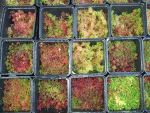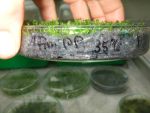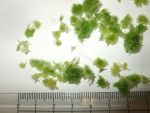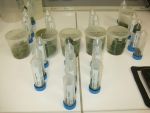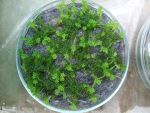MOOSzucht
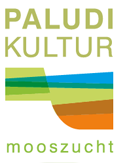
Joint project: Breeding and mass propagation of peat moss in Sphagnum farming to create a sustainable supply of renewable raw material for horticultural growing media.
To reach high yields and thus make Sphagnum farming economically feasible the joint project ‘MOOSzucht’ aims to increase current Sphagnum productivity by 30 % through selection and breeding. Several wild provenances of Sphagnum species (suited for growing media) will be genetically characterized (SSR marker assays) to understand the relationship between and distribution of Sphagnum genotypes. Highly productive provenances are then selected for further cultivation and propagation. In addition, breeding trials with axenic cultures will serve to increase productivity through polyploidization using protoplast transfer (Sphagnum Smart Breeding, SSB).
Large-scale implementation of Sphagnum farming is currently hampered by a lack of appropriate volumes of high quality moss propagules as seeding material for new cultivation sites. To address this issue, ‘MOOSzucht’ aims for large scale mass propagation of Sphagnum propagules in a photobioreactor. This innovative production method requires axenic cultures of the Sphagnum material as well as optimal growing conditions in the photobioreactor. Also non-axenic Sphagnum mass propagation on irrigated fleece will be tested and optimized.
The performance of the seeding material produced in the project will be tested under field conditions in our demonstration site ‘Hankhauser Moor’ in Lower Saxony (Germany).
Contents
The four subprojects of MOOSzucht focus on:
- Collection, genetic characterization, and selection of highly productive wild Sphagnum provenances (Uni Greifswald)
- Smart Sphagnum Breeding (SSB) of new Sphagnum cultivars to increase productivity (Uni Freiburg)
- Establishment and optimization of axenic in vitro propagation of Sphagnum in a photobioreactor (Uni Freiburg, KIT)
- Design and construction of a new type of a photobioreactor for large scale mass propagation of Sphagnum seeding material (KIT)
- Optimization of non-axenic mass propagation of Sphagnum seeding material on irrigated fleece (NIRA, Uni Greifswald)
- Testing establishment of produced seeding material under field conditions (Uni Greifswald, subtask)
Joint network partners
- University of Greifswald, Institute of Botany and Landscape ecology (Uni Greifswald),
Department Peatland studies and Paleoecology, Partner in the Greifswald Mire Centrum - University of Greifswald, Institute of Botany and Landscape ecology (Uni Greifswald)
Department General and special Botany, Partner in the Greifswald Mire Centrum - Albert-Ludwigs-University of Freiburg, Faculty of Biology II, Department Plant Biotechnology (Uni Freiburg)
- Karlsruhe Institute of Technology – KIT, Bioprocess Engeneering, Institute of Process Engineering in Life Sciences, Department Bioprocess Engineering (KIT)
- Enterprise Niedersächsische Rasenkulturen NIRA GmbH & Co. KG (NIRA)
Publications
Prager, A., Decker, E., Heck, M., Joosten, H., Kohl, M., Krebs, M., Lamkowski, P., Lüth, V., Melková, I., Posten, C., Reski, R., Schade, C., Schäfer, M., Schnittler, M., Schreiter, H. & Gaudig, G. (2023) Züchtung und Massenvermehrung von Torfmoosen zur industriellen Produktion eines nachwachsenden Substratausgangsstoffes für den Gartenbau (MOOSzucht), Abschlussbericht des Verbundprojektes. 64 S.
Käärmelahti, S.A., Temmink, R.J.M., van Dijk, G., Prager, A., Kohl, M., Gaudig, G., Koks, A.H.W., Liu, W., Vroom, R.J.E., Gerwing, K., Peters, C.J.H., Krebs, M. and Fritz, C. (2023) Nutrient dynamics of 12 Sphagnum species during establishment on a rewetted bog. Plant Biol J. https://doi.org/10.1111/plb.13534









